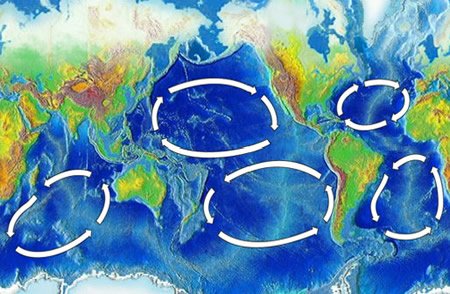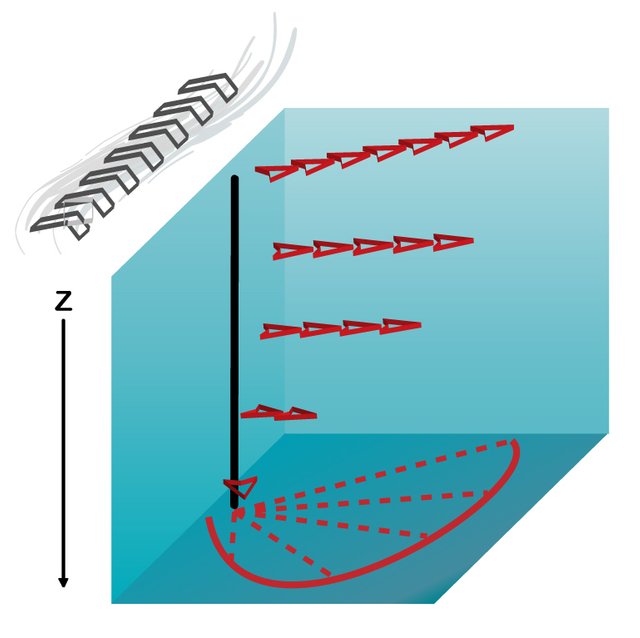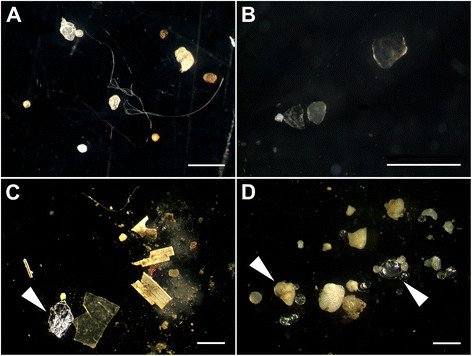A Sea of Garbage - An "Informative" Rant
While browsing Google's News Site today, I stumbled upon this article by Doyle Rice and honestly, it pissed me off. Here's a quick excerpt from the article if you don't want to read it:
The Great Pacific Garbage Patch, a collection of plastic, floating trash located halfway between Hawaii and California, has grown to more than 600,000 square miles, a study published Thursday finds. That's twice the size of Texas.
So, this is what led me to the little rant below...
Most of the aforementioned garbage comes in the form of plastic, and no, not a single blob of plastic. There are roughly 2 trillion pieces of plastic in just this one area (this doesn't account for the rest of the plastic in the ocean).
So, some of you might be asking why the garbage forms into patches as the one mentioned above. The answer is simple:
Gyres

Source--License: Public Domain
The gyres are the circles made by the arrows. The arrows represent ocean currents driven by the Coriolis Effect. The Coriolis Effect deflects winds and currents clockwise in the northern hemisphere and counterclockwise in the southern hemisphere. But how do gyres cause the patches? When we (shitty humans) improperly dispose of waste, it tends to end up in the ocean. Once it is in the ocean in either the northern or southern hemispheres, the garbage gets caught in one of the currents and starts to go around the gyre.
If the garbage is just going around in the circles, it would never reach the center to create these patches. So, what pushes it out?
Ekman Transport

Source--License: Public Domain
As you can see in the picture, the net water moves at an angle (roughly 90 degrees) to the right (northern hemisphere) and to the left (southern hemisphere) of the wind direction over 100 to 150m. This net water transport is what actually pushes the water towards the center of the gyres leaving them to be stuck there and build mass. This transport along with other processes help break the macroplastics down into small fibers called
Microplastics
 Source--License: Creative Commons
Source--License: Creative Commons
This is where my main issue is with what we're doing to the environment. As many people (@mountainwashere @samminator @munawar1235) have mentioned before, microplastics are killing our oceans.
Microplastics are a ubiquitous pollutant in our seas today and are known to have detrimental effects on a variety of organisms (Wieczorek et al., 2018).
In fact, it's such an issue that even the more intermediate-dwelling fish in the water column are being affected:
Seventy-three percent of all fish contained plastics in their gut contents with Gonostoma denudatum having the highest ingestion rate (100%) followed by Serrivomer beanii (93%) and Lampanyctus macdonaldi (75%). Overall, we found a much higher occurrence of microplastic fragments, mainly polyethylene fibres, in the gut contents of mesopelagic fish than previously reported. Stomach fullness, species and the depth at which fish were caught at, were found to have no effect on the amount of microplastics found in the gut contents (Wieczorek et al., 2018).
What is a microplastic, you ask? Well, microplastics are small plastic pieces less than five millimeters long which can be harmful to our ocean and aquatic life (NOAA). In my current marine chemistry lab, we are doing research over microplastics at the moment and we found (with 110 separate people performing the counts and us taking the average) that at one of the local marshes the average count for microplastics was 52.2 microplastics per liter of water and from just throwing a bucket and sampling water from the beach, the average count was 72.1 microplastics per liter of water.
This beach is virtually untouched by humans too, as it is a private island donated for research to the university I attend. I'd like to share this raw data with you, but not technically sure if that's allowed at my university.
Let's do some math. There are roughly 1.26E22 liters of water in the ocean... If there are 72.1 microplastics per liter of water, then there are roughly 9.0846E+22 microplastics in our ocean and I'm certain this number is quite conservative.
Microplastics are not the only issue about plastics, but I'll be damned if it is not one of the main issues. Macroplastics are bullshit too.
We need to work together to stop polluting the oceans. This issue directly affects every single person on the planet whether they realize it or not.
Here are some links to what we can all do better to minimize the use of plastics and hopefully save the environment in the process:
- https://www.reefrelief.org/2013/01/51-ways-to-reduce-plastic-use-or-completely-eliminate-it/
- http://www.greeneducationfoundation.org/nationalgreenweeksub/waste-reduction-tips/tips-to-use-less-plastic.html
More plastic reading material:
- https://www.theoceancleanup.com/updates/how-ocean-plastics-turn-into-a-dangerous-meal/
- https://www.theoceancleanup.com/updates/investigating-plastic-detection-from-space/
Sources:
https://www.usatoday.com/story/tech/science/2018/03/22/great-pacific-garbage-patch-grows/446405002/
https://www.frontiersin.org/articles/10.3389/fmars.2018.00039/full
https://oceanservice.noaa.gov/facts/microplastics.html

.gif)
WARNING! The comment below by @muks leads to a known phishing site that could steal your account.
Do not open links from users you do not trust. Do not provide your private keys to any third party websites.
Plastic counts do tend to run a little higher near shorelines and in the gyres from what I've heard, so that might affect the math a bit.
There was a shortish-lived comic, Great Pacific, about somewhat building a nation on the floating trash in the ocean. Super fictionalized, of course, since the trash is at no point thick enough to walk on.
They do run higher near shorelines due to getting caught in longshore transport and not actually being able to effectively escape... However, near untouched beaches, the count runs lower than the "tourist" beaches, so this is still kind of a low number compared to what one would expect from a busy beach.
I believe it!
An issue well worthy of a rant!
And it cannot be stressed enough.
This post has received a 0.14 % upvote from @drotto thanks to: @banjo.
It certainly must be very difficult to control our contamination 100%, simply because people are impossible to control.
What we can do about this subject, is not only keep sharing information with more and more people, but also helping in the development of new technologies designed to clean our oceans.
The better our technological level, the better we will be, and the better our planet will be.
Even if we can just control ~50% of our contamination we will be helping the environment that much more.
Clean up projects are going to be essential for the survival of multiple species.
This is true, and as a matter of fact, I think more and more people are gaining awareness about this issue.
Wow, really well thought out post, @branbello! Microplastics to fish are like smog is for humans. So sad that it's come to this. Poor fishies.
It is very sad, I just wish we had an efficient method of successfully cleaning plastics from the ocean. :/
Great analogy by the way, I'm going to steal it one day.
Yeah, and a biodegradable option that's economically viable for mass adoption! Lol. No need to steal. It's all yours! 😄
Great read. I'm actually about to write an article about how plastics have already become part of the geological makeup on our planet. I'm glad you mentioned the danger micoplastics pose to the environment. A lot of people don't consider the fact this effects us as well.
We ran some tap water samples through a filter and looked for microplastics in tap... It was there. I think like 15 microplastics per liter is the average we found.
We managed to screw up the entire planet in such a short time! Hundreds of species of fish and marine creature will go extinct because of the plastic pollution. Besides that, the overfishing is another serious issue needs to be addressed. I don't even dare to talk about the warming - can't understand how people believe it's a hoax?!
Overfishing irks me so bad. Needs to stop, but it won't.
Being A SteemStem Member
Congratulations! This exceptional post has been featured in Episode 15 of The STEEM Engine Express Podcast. Click the link to hear what I had to say, and keep up the good work!